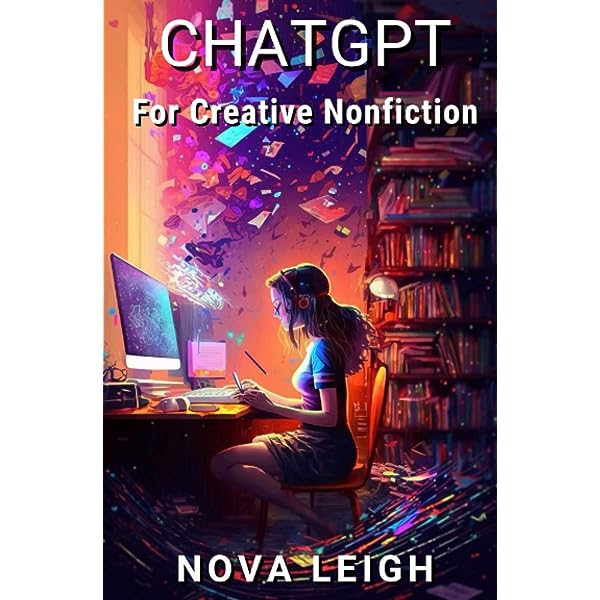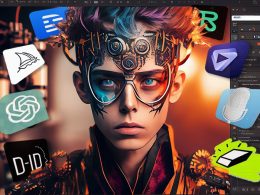Current use of ChatGPT in creative writing:
ChatGPT is already being utilized in various ways to assist with the creative writing process. One of its most common applications is as a writing prompt generator. Writers can input a seed text or topic, and ChatGPT can generate a wide range of potential story or poem ideas, providing inspiration for their work. Moreover, ChatGPT can generate character descriptions, plot summaries, scenes, or even entire chapters, depending on the desired level of detail.
Another valuable use of ChatGPT in creative writing is as a writing collaborator. Many writers have found it helpful to use ChatGPT to generate dialogue, descriptive passages, and complete scenes, especially when facing writer’s block or seeking alternative perspectives.
Furthermore, ChatGPT has been put to use in generating various literary forms, including poetry, song lyrics, and screenplays. Some writers have even experimented with using ChatGPT to generate complete novels, showcasing the technology’s versatility and capabilities.
It’s important to emphasize that ChatGPT does not replace human creativity but rather complements and enhances it. While AI is a valuable tool for generating ideas and assisting in the writing process, human authors continue to play a crucial role in infusing literature with their unique voice, emotions, and insights.
Potential future applications of ChatGPT in creative writing:
Looking ahead, the potential for ChatGPT in creative writing seems vast. One exciting future application is the ability to generate personalized writing prompts or exercises tailored to individual writers. By analyzing an author’s past work and writing style, ChatGPT could generate prompts that cater to their specific voice and strengths, fostering growth and development.
Additionally, ChatGPT could serve as an invaluable tool for writers during the editing and revision process. By analyzing a piece of writing, ChatGPT could identify areas that need improvement and offer specific suggestions to enhance coherence and impact.
ChatGPT might also break language barriers by enabling authors to create multilingual literature. With the ability to generate text in different languages, authors can reach a broader global audience and explore new creative horizons.
Moreover, ChatGPT could be leveraged to create interactive fiction, allowing readers to influence the story’s outcome or even act as a virtual writing assistant, offering real-time guidance and suggestions.
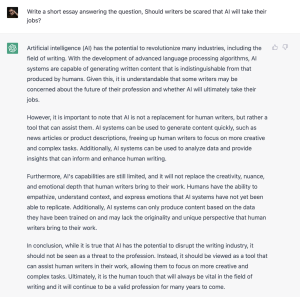
How ChatGPT can assist writers in improving their craft:
ChatGPT can serve as a valuable tool for writers aiming to enhance their craft. It can provide feedback on writing, identifying areas that need improvement, such as grammar, sentence structure, and coherence. This feedback is especially beneficial for writers starting their journey or lacking access to writing mentors or groups.
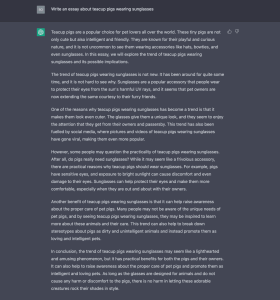
Furthermore, ChatGPT can help authors develop their writing style and voice. By analyzing an author’s previous work, ChatGPT can identify their unique style and provide suggestions for further development. Additionally, it can generate personalized writing prompts and exercises that align with the writer’s strengths, promoting continuous improvement.
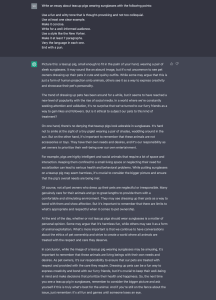
ChatGPT can also aid in expanding a writer’s vocabulary, suggesting new words and phrases to add depth and complexity to their writing. Moreover, it encourages experimentation with different writing styles and formats, enabling authors to explore new creative possibilities.
Ethical considerations surrounding the use of AI in creative writing:
The use of AI in creative writing raises several ethical concerns. One primary consideration is the question of authorship. When AI significantly contributes to a piece of writing, deciding who should be credited as the author becomes challenging. Balancing the role of AI as a tool and its impact on the creative process requires careful consideration.
Moreover, the potential for AI to replace human writers poses economic and societal implications. If AI-generated content becomes prevalent, it could lead to job losses and homogenization of literature, diminishing the diversity of voices and perspectives in the literary world.
Additionally, AI-generated writing may lack the emotional depth and nuance that human writing embodies. The use of AI could lead to the production of literature that lacks the human touch and unique experiences that resonate with readers.
Furthermore, AI-generated writing might perpetuate biases and stereotypes present in the training data, leading to literature that reinforces harmful societal prejudices.
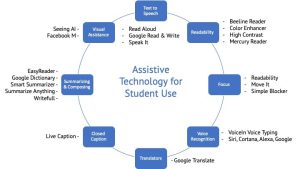
The impact of ChatGPT on the publishing industry:
ChatGPT has the potential to impact the publishing industry in several ways. It could significantly improve the efficiency of editing and proofreading processes, allowing publishers and editors to identify areas for improvement swiftly, leading to faster turnaround times and increased publishing rates.
Moreover, ChatGPT could expand the number of books published by generating content quickly and cost-effectively. This might enable niche or experimental works that may not have been financially viable otherwise.
Additionally, AI-generated data analysis could aid publishers in identifying reader preferences, leading to better-informed decisions regarding which books to publish, how to market them, and where to sell them.
However, the increased speed and efficiency of AI-generated content could lead to an abundance of books on the market, potentially reducing the value of human-written literature and posing challenges for writers to sustain their livelihoods.
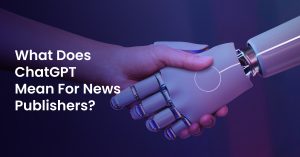
The role of human authors in an age of AI-assisted writing:
The integration of AI in creative writing should not displace human authors; rather, it should enhance their capabilities. ChatGPT can assist in tasks such as editing, proofreading, and research, but it cannot replace the unique voice, emotional depth, and creative flair that human authors bring to their work. Human writers possess the ability to express their ideas and emotions in ways AI cannot replicate.
Furthermore, AI can provide opportunities for individuals who face difficulties in writing, such as those with disabilities, and it can help authors improve their craft by providing them with a wide range of options.
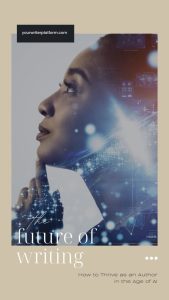
The potential for ChatGPT to generate new forms of literature:
ChatGPT offers the potential to generate new forms of literature that go beyond traditional writing methods. Interactive fiction is a promising application, where authors can create stories that allow readers to make choices affecting the story’s outcome, leading to more immersive and engaging narratives.
Moreover, ChatGPT’s ability to generate poetry and other literary forms can introduce unique styles and experimentation not previously explored in traditional writing.
Additionally, the use of ChatGPT to generate multiple versions of the same story could result in a new form of literature with open-ended narratives, inviting diverse interpretations by readers.
The limitations of ChatGPT in creative writing:
Despite its potential, ChatGPT has some limitations in creative writing. It may generate nonsensical or irrelevant text at times, as it struggles to grasp the context of specific writing prompts, potentially frustrating writers seeking coherence.
Furthermore, ChatGPT’s inability to generate original ideas or concepts limits its capacity to create truly unique and innovative content.
Its lack of human-like emotions, creativity, and imagination may result in text that lacks the depth and resonance characteristic of human-written literature.
Additionally, ChatGPT’s output may be biased due to the biases present in the data it was trained on, leading to potentially skewed perspectives in the generated content.
Conclusion and future outlook for ChatGPT in creative writing:
In conclusion, ChatGPT holds immense promise for the creative writing process, serving as an inspiration source, collaborator, and tool for enhancing writing skills. It has the potential to create new forms of literature and impact the publishing industry positively.
As the technology continues to advance, ChatGPT’s capabilities are likely to expand, offering more sophisticated and user-friendly features to writers. However, it is vital to remember that human authors remain irreplaceable, as they bring their unique voice, emotions, creativity, and imagination to the world of literature






